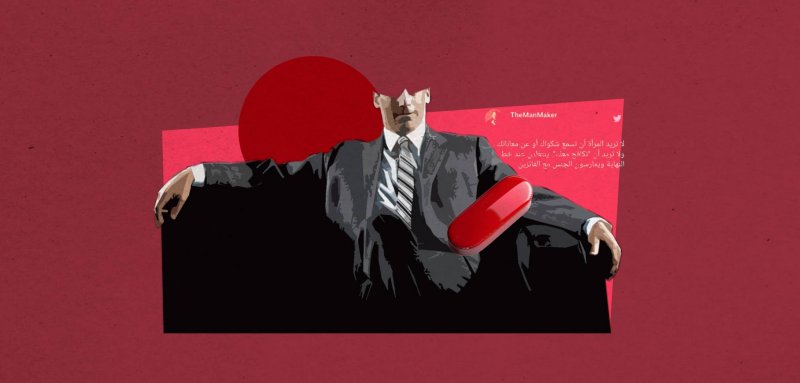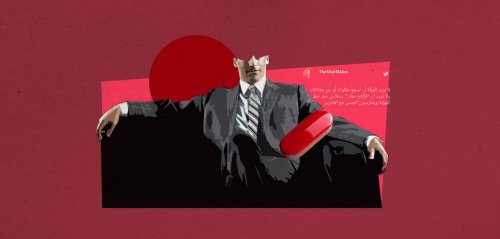The concept of the “alpha male,” promoted by social media influencers and relationship coaches, has had a serious impact on shaping dangerous perceptions of masculinity and what it means to be a "real man." Through social media discourse, the alpha male is presented as a lifeline to those seeking masculine discourse—a promise of salvation from the dangers of weakness and failure with women, all within the framework of the “Red Pill” movement.
Recently, the Red Pill narrative has spread across the Arab online space, aiming to propagate its philosophy and "awaken" men to what it claims is the truth about their subjugation and subordination to women and the supposed agendas of media, education systems, and other institutions that allegedly empower women at the expense of men’s rights.
Recently, the Red Pill narrative has spread across the Arab online space, aiming to propagate its philosophy and "awaken" men to what it claims is the truth about their subjugation and subordination to women and the supposed agendas of media, education systems, and other institutions that allegedly empower women at the expense of men’s rights. Often associated with the alt-right and extremist ideologies, the Red Pill concept is drawn from the movie The Matrix, where the protagonist, Thomas Anderson (Neo), takes the red pill to uncover harsh truths about society and reality.
Using a biased interpretation of evolutionary psychology, the Red Pill ideology alleges that women instinctively seek controlling, dominant men—those who display traits like toughness and aggression—to satisfy their sexual desires (i.e., alpha males). Simultaneously, they desire another type of man—the "nice guy"—for long-term support, financial security, and caregiving (referred to as beta males). Moreover, this ideology claims that a woman’s quest for the best available male does not end with marriage, stating that emotional bonds are unimportant to women and alleging that women feign romance while, in reality, they are manipulative and view love through a Machiavellian lens.
According to this view, a “real man” should understand that love belongs to the world of Disney. It also alleges that love doesn't equate to a woman offering affection, intimacy, or acceptance, and instead, is a trap set by women to exploit men’s financial resources and fulfill her desires.
Within the Red Pill discourse, women are not treated as human beings with whom one can engage in meaningful communication. Instead, they are viewed as "objects" that men use to enhance their sense of power and importance, as well as to gain recognition, validation, and benefits, prioritizing power over connection, as psychoanalyst Alexander Lowen suggests.
 An example of Red Pill content in Arabic on social media telling men that women actually want the most aggressive men to “submit to.”
An example of Red Pill content in Arabic on social media telling men that women actually want the most aggressive men to “submit to.”
An example of Arabic Red Pill content on social media telling men that women actually want the most aggressive men to “submit to.”
The Red Pill presents its rhetoric as a “self-help movement designed to protect men from the cunning and deception of women.” While it may attract a certain type of man—those lacking empathy and desiring dominance—it also appeals to men who have experienced repeated romantic rejection and disappointment, offering them what they believe to be the key to understanding female behavior and teaching them "true masculinity."
 A glimpse into Arabic Red Pill content claiming that it's a myth women don’t tell their husbands they've been harassed because he might not believe them. Instead, it suggests women do so because it is an "exciting secret adventure with another masculine man."
A glimpse into Arabic Red Pill content claiming that it's a myth women don’t tell their husbands they've been harassed because he might not believe them. Instead, it suggests women do so because it is an "exciting secret adventure with another masculine man."
A glimpse into Arabic Red Pill content claiming that it's a myth women don’t tell their husbands they've been harassed because he might not believe them. Instead, it suggests women do so because it is an "exciting secret adventure with another masculine man."
What is an alpha male?
The alpha male is the ideal form of manhood sought by all followers of the Red Pill movement. Although there is no single definition, the alpha is essentially the man at the top of the social hierarchy—sexually successful, wealthy or earns a lot of money, and surrounded by a network of high-value men he can benefit from and who respect him because he is of higher status. He is believed to reach his peak in his late thirties, and is often portrayed as muscular and pursued by numerous women vying for his attention. The alpha is not one to "revere family and marital life," nor is he familiar with emotions other than feelings of power.
The Red Pill presents its rhetoric as a “self-help movement designed to protect men from the cunning and deception of women.” While it may attract a certain type of man—those lacking empathy and desiring dominance—it also appeals to men who have experienced repeated romantic rejection and disappointment, offering them what they believe to be the key to understanding female behavior and teaching them "true masculinity."
Dominance and strength are at the core of the Red Pill ideology. However, the type of strength it promotes as an essential trait of the alpha male is not genuine strength rooted in inner values but rather a brittle facade—a fragile form of power that depends on the creation of a “False Self” built on external factors like physical appearance, wealth, and sexual prowess. As a result, self-improvement is a significant part of the Red Pill movement, but it mainly focuses on how a man can "appear strong."
The True Self and the False Self are two concepts coined by British psychoanalyst Donald Winnicott. The True Self refers to an individual's authentic identity, capable of spontaneous experiences, creativity, and genuine connection with reality. In contrast, the False Self develops in response to social pressures or conditional acceptance one has received in childhood. This False Self emerges from the child’s innate desire to seek connection and approval and is shaped by societal expectations and others’ desires.
The False Self is what the Red Pill narrative strives to create, mold, and develop. This False Self manifests in several ways within the Red Pill discourse:
Narcissistic shields
The Red Pill ideology rejects any form of weakness, even when it’s deeply rooted in common human nature. This is because it seeks to build a sense of power and independence based on the illusion that failure doesn’t exist and that there’s no need for others. As a result, vulnerability becomes a humiliating reminder of the inability to meet alpha male standards.
The Red Pill's guidelines focus on strategies to attract the most submissive women, making it easier for the alpha to impose his masculine frame. This is achieved through subtle aggression and manipulation tactics, which resemble those used by individuals with narcissistic and psychopathic personality disorders to control their victims. The goal is to weaken women within relationships and make them feel insecure.
 An example of Arabic Red Pill content on social media claiming women do not actually care about men or want to “struggle” with them, but rather “wait at the finish line to sleep with the winners.”
An example of Arabic Red Pill content on social media claiming women do not actually care about men or want to “struggle” with them, but rather “wait at the finish line to sleep with the winners.”
Examples of this include the need for others, which can manifest as the desire to be loved, understood, or seen, or feelings of gratitude for a woman’s presence—all of which indicate a dependency on someone else. The alpha male, however, claims he needs no one. Emotions like guilt or regret might reveal imperfection, but the alpha male insists he is flawless. Furthermore, feelings of vulnerability can undermine the alpha male’s ability to exert his power and control.
Another notable trait is that, within the Red Pill discourse, women are not treated as human beings with whom one can engage in meaningful communication. Instead, they are viewed as "objects" that men use to enhance their sense of power and importance, as well as to gain recognition, validation, and benefits. This is because the False Self prioritizes power over connection, as psychoanalyst Alexander Lowen suggests.
Dominance and strength are at the core of the Red Pill ideology. However, the type of strength it promotes as an essential trait of the alpha male is not genuine strength rooted in inner values but rather a brittle facade—a fragile form of power that depends on creating a “false self” built on external factors like physical appearance, wealth, and sexual prowess.
The Red Pill's guidelines, therefore, focus on strategies to attract the most submissive women, making it easier for the alpha to impose his masculine frame. This is achieved through subtle aggression and manipulation tactics, which resemble those used by individuals with narcissistic and psychopathic personality disorders to control their victims. The goal is to weaken women within relationships and make them feel insecure.
Tactics include ignoring the woman, provoking her jealousy, blaming her, pointing out her failures, and maintaining multiple relationships outside of marriage so that she is not the sole source of sex. Financial independence is also undermined, whether by preventing her from working or controlling her financial resources to stop her from saving money.
 An example of Arabic Red Pill content on social media claims that women are “designed” to serve men, that they are not equal to men, and that they do not need education, money, or a job.
An example of Arabic Red Pill content on social media claims that women are “designed” to serve men, that they are not equal to men, and that they do not need education, money, or a job.
Red Pill content on social media claiming that women are “designed” to serve men, that they are not equal to men, and that they do not need education, money, or a job.
 A comment on Arabic Red Pill content on social media asserts that a man must always have a replacement for his wife in case she defies him.
A comment on Arabic Red Pill content on social media asserts that a man must always have a replacement for his wife in case she defies him.
A comment on Arabic Red Pill content on social media asserts that a man must always have a replacement for his wife in case she defies him.
If these tactics fail to produce the desired level of "submission" and "objectification," the woman is simply replaced by someone more compliant. The principle is clear: "Do not invest in women emotionally or financially, for the one who invests more is the weaker party." Based on this, men are encouraged to invest as little as possible in relationships, both emotionally and financially, to avoid feeling loss or regret.
Red Pill tactics include ignoring the woman, provoking her jealousy, blaming her, pointing out her failures, and maintaining multiple relationships outside of marriage so that she is not the sole source of sex. Financial independence is also undermined, whether by preventing her from working or controlling her financial resources to stop her from saving money, since it encourages a sense of independence and self-sufficiency. If these tactics fail to produce the desired level of "submission" and "objectification," the woman is simply replaced by someone more compliant.
One of the active male members in the "Man Revaluation" group advises that "a man whose wife experiences postpartum depression should send her back to her parents' house until she comes to her senses. If it takes too long, he should marry someone else."
 A post on an Arabic Red Pill social media group attacks a woman giving advice to women on religious matters.
A post on an Arabic Red Pill social media group attacks a woman giving advice to women on religious matters.
A post on an Arabic Red Pill social media group attacks a woman advising women on religious matters.
One way the alpha supports his false sense of strength is by creating caricatures that belittle other groups of men, reducing them to traits that signify weakness and worthlessness. The beta—the opposite of the alpha—is portrayed as a submissive man, often depicted in memes as crawling on his knees in humiliation before a domineering woman pointing her finger in command. He is also shown as a "gullible sheep" supporting a woman in distress, only to transform into a fierce wolf when offered the Red Pill.
There is also the "simp," a man who defends women’s rights and offers them services to obtain attention or sex. Women, according to the Red Pill narrative, use him merely to validate their attractiveness and seductive power, only to leave him frustrated as they move on to others—usually the alpha male—without giving the simp anything.
 Red Pill content online comparing how supposedly women treat “simps” and “alpha males.”
Red Pill content online comparing how supposedly women treat “simps” and “alpha males.”
Red Pill content online comparing how supposedly women treat “simps” and “alpha males.”
These categories, created by the Red Pill movement, fuel feelings of power and importance by devaluing women as a psychological tactic used by men to bolster their self-esteem and reassure themselves of their attractiveness and authority.
The fundamental similarity between “the simp” and “the alpha”
The constant affirmations and recommendations within male groups often discuss what supposedly attracts or repels women in men, with any behavior contrary to kindness or gentleness described as appealing to women. However, the Red Pill community fails to recognize the fundamental similarity between the simp and their ideal model, the alpha. Both are driven by a deep need for female recognition, validation and a desperate quest for her approval.
The Red Pill narrative promotes categories like the “beta” and the “simp” to fuel the alpha male's sense of power and significance, without acknowledging the essential resemblance between the alpha and the simp.
While the simp seeks to please women by playing the role of savior, the alpha aims to dominate and control them, believing this is what women desire. Beneath this apparent polarity lies a shared desire: to deny the True Self in favor of a fabricated and distorted image of "manhood" and masculinity that conceals deep insecurities.
Within Red Pill groups, there is a persistent fear of the "fall of the alpha," most notably represented by the anxiety surrounding the "alpha widow." This is a woman who has a past with a dominant, high-status Alpha male who left an indelible mark on her spirit, such that she can never move on or forget him. She will remain his widow and will compare every man she meets to him.
 Red Pill content online warning men of being with the "alpha widow" who compares every man she meets to her former alpha male companion.
Red Pill content online warning men of being with the "alpha widow" who compares every man she meets to her former alpha male companion.
Red Pill content online warning men of being with the "alpha widow" who compares every man she meets to her former alpha male companion.
 Red Pill content online warning men of being with women who have been “used and consumed” by other men.
Red Pill content online warning men of being with women who have been “used and consumed” by other men.
Red Pill content online warning men of being with women who have been “used and consumed” by other men.
While the simp seeks to please women by playing the role of savior, the alpha aims to dominate and control them, believing this is what women desire. Beneath this apparent polarity lies a shared desire: to deny one’s true self in favor of a fabricated and distorted image of "masculinity” that conceals deep insecurities.
In Red Pill ideology, this woman is forbidden because she represents a threat to the alpha’s power and attractiveness in the eyes of his woman if she compares him to another man from her past—or even her present. As a result, there is a particular resentment toward the figure of “the boss”, as he is likely to be an alpha. This fear of a new alpha emerging reveals only the deep anxiety and insecurity about one’s own attractiveness and the constant effort to escape the perceived threat of another potential alpha. It is narcissistic competition that seeks to protect the fragile self and preserve grandiose perceptions of the self.
 Red Pill content online resenting women for “serving” their bosses at work and not their “alpha males” at home.
Red Pill content online resenting women for “serving” their bosses at work and not their “alpha males” at home.
The body holds special significance within the Red Pill ideology because it serves multiple purposes: as an important tool for asserting a specific form of strength and ideal masculinity, and as a source of attraction for women. Therefore, the ideal male body is strong, masculine, and well-built.
Control as the foundation of the Red Pill
If these are the prominent aspects of control within the Red Pill narrative, why does control hold such importance for the alpha male? And how does it serve and benefit him? The answer becomes clearer through Erich Fromm’s contribution based on analytical psychology, which helps us understand individuals' inclination toward domination and control. This analysis also highlights the similarity between the desire for dominance in the alpha male and the authoritarian personality described by Fromm in his book Escape from Freedom.
Fromm posits that the life history of a person does not begin with individuality, but rather as a child united with his mother. In this stage, the child does not recognize his mother and his world as separate entities. This unity, or dependence, gives the child a sense of security and belonging, which Fromm calls "primary bonds."
The Red Pill principle is clear: "Do not invest in women emotionally or financially, for the one who invests more is the weaker party." Based on this, men are encouraged to invest as little as possible in relationships, both emotionally and financially, to avoid feeling loss or regret.
However, this childhood security is not permanent. As the child grows, they begin to separate from these primary bonds that provide comfort. This separation not only brings independence and liberation but also introduces feelings of loneliness, anxiety, and powerlessness due to the loss of those early bonds. At this critical juncture, two paths emerge for dealing with this anxiety: confrontation (fight) or escape (flight). Confrontation involves forming spontaneous relationships with people and nature based on love and productive work, without compromising one's individuality or independence. Escape, on the other hand, involves relieving the burden of this freedom by creating substitute secondary bonds and adopting alternative dependencies that provide a false sense of security.
Domination, Fromm argues, can be one such form of secondary dependency, offering temporary false security. It involves depending on an external object or person for a sense of belonging. Those who choose this path tend to give up their individual autonomy, merging with someone or something in the hope of regaining the security and sense of belonging they once had.
Thus, for the alpha to assert his dominance, he needs a submissive female or object to depend on to exercise his control and dominance. The authoritarian personality, as described by Fromm, seeks what he called a "symbiotic relationship," which entails a union between the self and an external object or person. This means that the dominant person needs a weaker, submissive counterpart to exert control over, as he requires another person to feel that he is their master. This is precisely what the alpha seeks—he cannot assert his dominance or masculinity without a submissive woman or subservient followers.
The Red Pill claims to offer the truth, but in reality, it offers self-fulfilling prophecies. It distorts and reshapes reality to fit a biased view of women.
According to Fromm, the inclination to either submit or dominate are two sides of the same coin, both seeking a solution to the same problem, albeit in different ways. The submissive personality desires to become part of something larger, whether that is an idea, institution, or an alpha. These individuals long to be absorbed by a power greater than them, freeing them from the burden of existence and allowing them to disappear into another entity, thereby escaping the weight of their individuality. Similarly, the authoritarian personality feels powerful when they "swallow" another person, escaping their own loneliness and individuality. However, when he loses the object of his control or is unable to devour (dominate) others, he returns to a state of solitude.
The mirage and delusions of the Red Pill
When members of Red Pill communities enthusiastically repeat that all women are bad and claim to have experienced or witnessed this firsthand, they are, within the context of their experiences, telling the truth. This is because our choices in romantic partners are rarely random. We often repeat the same choice over and over without realizing it, selecting in a partner a reflection of our old wounds—reflecting our beliefs about ourselves and others, which have been shaped by early life experiences.
 Red Pill content online claiming that women do not want to be treated lovingly and that they “want to be beaten every week to stay good.”
Red Pill content online claiming that women do not want to be treated lovingly and that they “want to be beaten every week to stay good.”
Red Pill content online claiming that women do not want to be treated lovingly and that they “want to be beaten every week to stay good.”
If our past experiences were tragic, it’s likely—though not inevitable, depending on our self-awareness—that the mirror we choose will only reflect tragedies. Even if a Red Pill man finds the impossible woman he's searching for—one with whom no games are necessary, who is his safe haven and the ultimate submissive pertner—the seeds of self-destruction within him will find a way to lead him to destroy his happiness. In this case, he is his own enemy, not the woman.
This points to one of the fundamental and significant discoveries in psychoanalysis: the concept of "repetition compulsion." This principle suggests that we instinctively tend to recreate the destructive conditions we grew up in. In other words, we repeatedly set up situations that evoke feelings of deprivation, coldness, and abandonment. We are drawn to danger, deception, and manipulation, finding a peculiar allure in those who can replicate our unresolved conflicts with one of our parents. These individuals reaffirm the message we received from our parents that we are "unworthy of love." It is precisely these people in whom we can see beauty and angelic qualities that others might not notice, and we try to extract from them what our parents never gave us.
This unconscious drive leads to a cycle where we choose partners or situations that mirror our past traumas, seeking resolution but often ending up reinforcing the very wounds we are trying to heal.
It’s important to note that a man’s repeated choice of the same type of women does not give him the right to judge all women—only his own choices.
It’s important to note that a man’s repeated choice of the same type of women does not give him the right to judge all women—only his own choices. We must gather evidence from our past experiences, current behaviors, and deep-seated aspirations in order to form a coherent narrative about who we are, why we behave as we do, and why we choose certain partners. Are we choosing them to form intimate connections and achieve security, or are we driven by the thrill of pursuit and challenge?
In the end, the Red Pill claims to offer the truth, but in reality, it offers self-fulfilling prophecies. It distorts and reshapes reality to fit a biased view of women. Since we can only interact with others based on our beliefs and perceptions of them, this negative mental image shapes how a man interacts with women. These actions, in turn, influence how women respond to him. When you approach a woman harboring a "satanic" view of her, filled with suspicion and doubt about her intentions, and see your relationship with her as a game of control and deception while using manipulation as the only way to communicate with her, you have effectively set the stage for a dramatic escalation. Your prophecy begins to fulfill itself: the ghosts you imagined become real, and the "demons" you feared manifest in her words and actions toward you. You end up hating women even more and become even more convinced that the Red Pill offers the truth, only to repeat the same cycle with a new woman, this time with greater intensity.
Raseef22 is a not for profit entity. Our focus is on quality journalism. Every contribution to the NasRaseef membership goes directly towards journalism production. We stand independent, not accepting corporate sponsorships, sponsored content or political funding.
Support our mission to keep Raseef22 available to all readers by clicking here!
Interested in writing with us? Check our pitch process here!




